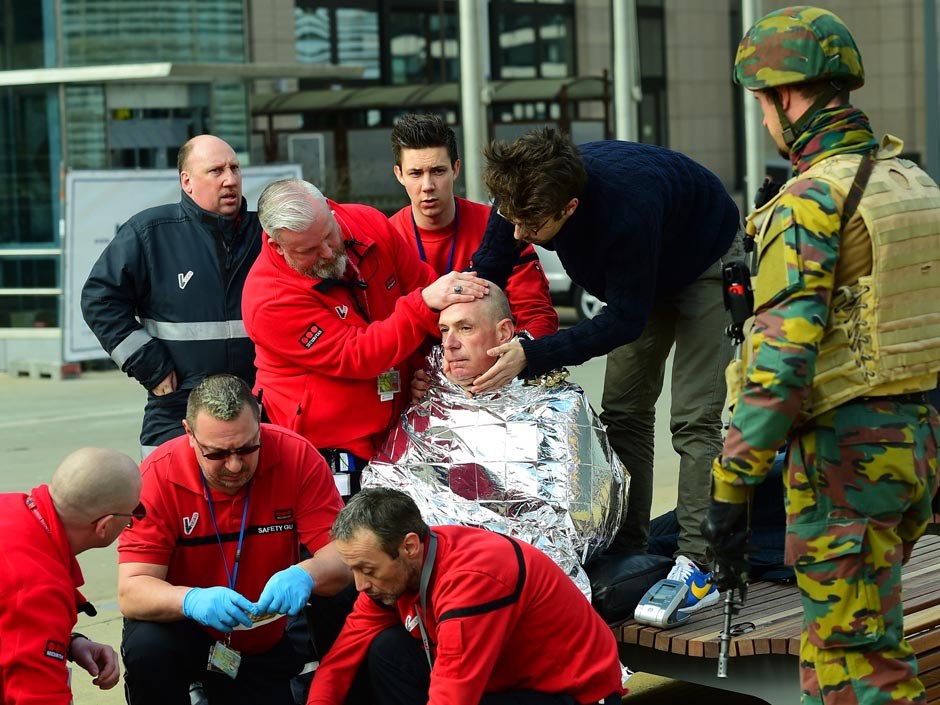The horrifying images from Belgium on Tuesday, with travellers covered in blood while smoke billowed around them, have become so familiar to us that we risk becoming jaded by them. We must not be.
My sense of it, having spent much of my adult life in the Middle East and Europe, is that we are still only at the beginning of this dreadful arc of terror and mayhem. Intelligence sources believe jihadists could strike 10 cities in Europe, North America and Asia at once, paralyzing global travel and commerce.
This is of a piece with reports that French police are convinced that as many as 90 suicide bombers are hiding in Europe awaiting instructions about when and where to blow themselves up.
Most westerners, including almost all Canadians, still have not begun to understand that they and their way of life are under attack by a lethal army of kamikazes who are convinced they are doing God’s work and that they will soon have a hallowed place in paradise. Governments in Europe are more seized with the threat posed by extremists than the public, but there has not yet been much impetus for the Canadian government to combat this growing peril.
One need only to have listened to Prime Minister Justin Trudeau’s tepid response to the multiple terrorist attacks carried out in Paris late last year and his decision to withdraw Canada’s thin combat contribution to the war against ISIL to understand that he does not regard Canadians as being in danger. His response was natural, given that Canada is a sleepy hollow and that Canadians have no idea what it is like to live in a city under what Belgian authorities said Tuesday was “the highest state of alert.”
Canada is not immune. About 100 Canadians are believed be fighting under ISIL’s flag in Iraq and Syria.
Aid workers from Quebec have been killed recently in terrorist strikes in Africa. A mining executive from Alberta has been kidnapped and is being held hostage by an Islamic group in the southern Philippines. There have been two terrorist attacks inspired by Islamic State on Canadian soil already. Several others have been thwarted.
The worst part of it is that nobody has any idea how many sleeper cells are out there. But with almost every street, bus stop and shopping centre a soft target, with travel so easy today, and so many potential terrorists carrying western passports and familiar with western ways, it is almost impossible to track all these people at once, especially when they disappear into flourishing Arab communities.
Brussels, with several districts that have Arab majorities, has been a nervous cauldron since the attacks in Paris were directly linked to people living there. In December, there was already an oppressive police presence in the Gare du Nord and the Gare du Midi. It is not an exaggeration to say that everyone was looking over their shoulders.
For now, Brussels is the epicentre of jihadism in Europe. To anyone not closely familiar with the pleasant but rather dull city of European Union bureaucrats and senior NATO officers, the gorgeous Grand Place, steak frites and steamed mussels, this may come as a surprise.
To those who visit the community of Molenbeek, near the city centre, it might not be.
If they walked around Molenbeek, as I did for many hours in the rain three months ago, they would understand why those responsible for protecting Europeans have had such a difficult time locating and confronting the terrorists who mix in with the millions of other Muslims now living among them.
About 100,000 people are crammed into Molenbeek, a few kilometres where a suicide bomber struck the subway station Tuesday, while two other bombers attacked the airport. Nearly half of the population in the dense warren of cobblestone streets in Molenbeek are Muslims, mostly of Moroccan descent.
Churches are mostly empty and almost derelict in that hardscrabble quarter. But the mosques are packed, as are shops and restaurants where Islamic dress and food not only predominate, they are about the only things to be seen. Arabic, much more than French or Flemish, is the lingua franca.
The challenge for Europe’s seriously overstressed security agencies is that it is difficult to penetrate places such as Molenbeek — and there are score of them across the continent.
It is not only Walloons and Flems who are afraid. The fear is palpable among the Arabs of Brussels, too. They detest being singled out by the police and the media and are terrified by the extremists who live among them. Their wariness at the few Caucasians who venture there is acute. The climate of fear makes everyone deeply suspicious and keeps almost everyone silent.





